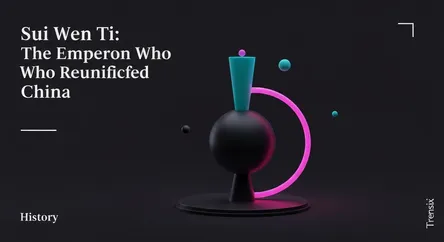History
Sui Wen Ti: The Emperor Who Reunified China

Discover Sui Wen Ti, the powerful founder of the Sui Dynasty who ended centuries of division to reunify China and pave the way for a golden age.
What is it?
Sui Wen Ti, born Yang Jian (541-604 AD), was the founding emperor of China's Sui Dynasty. He was a pivotal figure in Chinese history, renowned for reunifying China in 589 AD after nearly three centuries of political fragmentation and conflict during the Northern and Southern Dynasties period. Rising from an official in the Northern Zhou dynasty, he seized power and established the Sui dynasty in 581 AD. His reign was marked by significant political and social reforms, including the centralization of government, the implementation of the "Three Departments and Six Ministries" system, and the creation of a new legal code. A hard-working and frugal ruler, he also initiated massive public works projects, including the early construction of the Grand Canal and the reinforcement of the Great Wall.
Why is it trending?
Historical figures like Sui Wen Ti often trend as their accomplishments are revisited in popular media, documentaries, and academic research. His story is compelling: a tale of ambition, military strategy, and political acumen that ended a long period of civil war. The systems of government he established were so effective that they became the foundation for the subsequent, and much celebrated, Tang Dynasty, often considered a golden age in Chinese history. His use of Buddhism as a unifying cultural force is also a subject of continued interest. Sui Wen Ti's reign is studied as a classic example of nation-building and consolidating power after prolonged instability, making him a relevant figure in historical and political discourse.
How does it affect people?
Sui Wen Ti's actions had a profound and lasting impact on the Chinese people and the trajectory of the nation. By reunifying the country, he restored a sense of shared identity and cultural cohesion. His land reforms, known as the equal-field system, aimed to reduce the gap between the rich and poor by redistributing land to the peasantry, boosting agricultural output and improving livelihoods. The construction of the Grand Canal, though completed by his son, began under his rule and fundamentally linked northern and southern China, dramatically improving trade, transportation, and the movement of grain for centuries. The governmental structures he created promoted meritocracy over birthright and provided stability that laid the groundwork for centuries of prosperity.